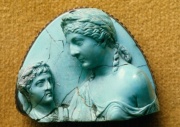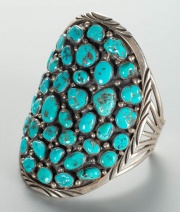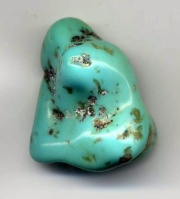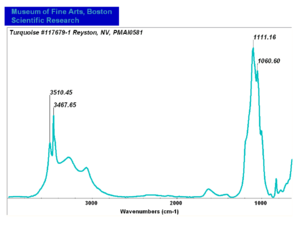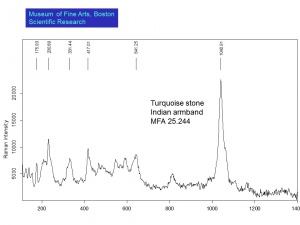Difference between revisions of "Turquoise"
(username removed) |
|||
| (10 intermediate revisions by 4 users not shown) | |||
| Line 1: | Line 1: | ||
| − | [[File:99.109-37-18.jpg|thumb|]] | + | [[File:99.109-37-18.jpg|thumb|Roman cameo<br>MFA# 99.109]] |
== Description == | == Description == | ||
| − | + | [[File:2004.2219-SC138132.jpg|thumb|Navajo bracelet<br>MFA# 2004.2219]] | |
An opaque sky-blue semiprecious gemstone. Turquoise is composed of a hydrated basic copper aluminum phosphate mineral. It was used for beads as early as 5000 BE in Mesopotamia. Major deposits were worked in Iran (Nishapur, Juh-e Zar, Kuh-i-Firouzeh) and on the Sinai Peninsula. Turquoise is also found in Siberia, Turkestan, Germany (Saxony), France, England (Cornwall), Australia and the U.S.(Mexico, Arizona, Colorado, California, New Mexico). Turquoise can be blue, greenish blue or green with inclusions of red sandstone. Turquoise is used for cabochon jewelry, inlays, beads and small carvings. | An opaque sky-blue semiprecious gemstone. Turquoise is composed of a hydrated basic copper aluminum phosphate mineral. It was used for beads as early as 5000 BE in Mesopotamia. Major deposits were worked in Iran (Nishapur, Juh-e Zar, Kuh-i-Firouzeh) and on the Sinai Peninsula. Turquoise is also found in Siberia, Turkestan, Germany (Saxony), France, England (Cornwall), Australia and the U.S.(Mexico, Arizona, Colorado, California, New Mexico). Turquoise can be blue, greenish blue or green with inclusions of red sandstone. Turquoise is used for cabochon jewelry, inlays, beads and small carvings. | ||
| − | |||
== Synonyms and Related Terms == | == Synonyms and Related Terms == | ||
| + | [[File:Turquoisef5.jpg|thumb|Turquoise stone]] | ||
| + | turqoius; calliana; callais; Mecca stones; Türkis (Deut.); turquesa (Esp., Port.); turquoise (Fr.); turkoise (Ned.) | ||
| − | + | == Risks == | |
| − | == | + | Stone can discolor to green with wear or contact with oils and grease |
| − | + | [[[SliderGallery rightalign|Turquoise, Reyston NV.PNG~IR (MFA)|Turquoise Raman.jpg~Raman (MFA)]]] | |
| − | Triclinic system | + | ==Physical and Chemical Properties== |
| − | + | * Soluble in hot hydrochloric acid | |
| − | Fracture | + | * Triclinic system; crystals are opaque, dense, cryptocrystalline or fine-grain massive; often mottled |
| − | + | * Fracture = conchoidal | |
| − | + | * Luster = waxy to subvitreous | |
| + | * Streak = white to pale green/blue | ||
| + | * Fluorescence = inert to weak greenish-yellow in LW; inert in SW | ||
| + | * Pleochroism = none to weak | ||
{| class="wikitable" | {| class="wikitable" | ||
| Line 26: | Line 30: | ||
|- | |- | ||
! scope="row"| Density | ! scope="row"| Density | ||
| − | | 2.6-2.9 | + | | 2.6-2.9 g/ml |
|- | |- | ||
! scope="row"| Refractive Index | ! scope="row"| Refractive Index | ||
| 1.61; 1.62; 1.65 | | 1.61; 1.62; 1.65 | ||
| + | |- | ||
| + | ! scope="row"| Birefringence | ||
| + | | 0.04 | ||
|} | |} | ||
| − | |||
| − | |||
| − | |||
| − | |||
| − | |||
| − | |||
| − | |||
| − | |||
| − | |||
== Comparisons == | == Comparisons == | ||
| Line 45: | Line 43: | ||
[[media:download_file_442.pdf|Properties of Common Gemstones]] | [[media:download_file_442.pdf|Properties of Common Gemstones]] | ||
| − | + | ==Resources and Citations== | |
| − | + | * Mineralogy Database: [http://www.webmineral.com/data/Turquoise.shtml Turquoise] | |
| − | == | + | * Gem Identification Lab Manual, Gemological Institute of America, 2016. |
| − | + | * Jack Odgen, ''Jewellery of the Ancient World'', Rizzoli International Publications Inc., New York City, 1982 | |
| − | * | + | * R.F.Symmes, T.T.Harding, Paul Taylor, ''Rocks, Fossils and Gems'', DK Publishing, Inc., New York City, 1997 |
| − | + | * A.Lucas, J.R.Harris, ''Ancient Egyptian Materials and Industries'', Edward Arnold Publishers Ltd., London, 4th edition, 1962 | |
| − | * | + | * ''Encyclopedia Britannica'', http://www.britannica.com Comment: "turquoise" [Accessed September 19, 2003]. |
| − | + | * C.W.Chesterman, K.E.Lowe, ''Audubon Society Field Guide to North American Rocks and Minerals'', Alfred A. Knopf, New York, 1979 | |
| − | * | + | * Wikipedia: [https://en.wikipedia.org/wiki/Turquoise Turquoise] (Accessed Nov. 9, 2005 and Dec 2022) |
| − | |||
| − | * ''Encyclopedia Britannica'', http://www.britannica.com Comment: "turquoise" | ||
| − | |||
| − | * | ||
| − | |||
| − | * Wikipedia | ||
| − | |||
* ''Encyclopedia of Archaeology'', Glyn E. Daniel, ed., Thomas Y. Crowell Co., New York, 1977 | * ''Encyclopedia of Archaeology'', Glyn E. Daniel, ed., Thomas Y. Crowell Co., New York, 1977 | ||
| − | + | * G.S.Brady, ''Materials Handbook'', McGraw-Hill Book Co., New York, 1971 Comment: p. 833 | |
| − | * | ||
| − | |||
* ''Van Nostrand's Scientific Encyclopedia'', Douglas M. Considine (ed.), Van Nostrand Reinhold, New York, 1976 | * ''Van Nostrand's Scientific Encyclopedia'', Douglas M. Considine (ed.), Van Nostrand Reinhold, New York, 1976 | ||
| − | + | * Michael McCann, ''Artist Beware'', Watson-Guptill Publications, New York City, 1979 | |
| − | * | ||
[[Category:Materials database]] | [[Category:Materials database]] | ||
Latest revision as of 15:04, 17 December 2022
Description
An opaque sky-blue semiprecious gemstone. Turquoise is composed of a hydrated basic copper aluminum phosphate mineral. It was used for beads as early as 5000 BE in Mesopotamia. Major deposits were worked in Iran (Nishapur, Juh-e Zar, Kuh-i-Firouzeh) and on the Sinai Peninsula. Turquoise is also found in Siberia, Turkestan, Germany (Saxony), France, England (Cornwall), Australia and the U.S.(Mexico, Arizona, Colorado, California, New Mexico). Turquoise can be blue, greenish blue or green with inclusions of red sandstone. Turquoise is used for cabochon jewelry, inlays, beads and small carvings.
Synonyms and Related Terms
turqoius; calliana; callais; Mecca stones; Türkis (Deut.); turquesa (Esp., Port.); turquoise (Fr.); turkoise (Ned.)
Risks
Stone can discolor to green with wear or contact with oils and grease
Physical and Chemical Properties
- Soluble in hot hydrochloric acid
- Triclinic system; crystals are opaque, dense, cryptocrystalline or fine-grain massive; often mottled
- Fracture = conchoidal
- Luster = waxy to subvitreous
- Streak = white to pale green/blue
- Fluorescence = inert to weak greenish-yellow in LW; inert in SW
- Pleochroism = none to weak
| Composition | CuAl6(PO4)4(OH)8 - 4H2O |
|---|---|
| Mohs Hardness | 5 - 6 |
| Density | 2.6-2.9 g/ml |
| Refractive Index | 1.61; 1.62; 1.65 |
| Birefringence | 0.04 |
Comparisons
Properties of Common Gemstones
Resources and Citations
- Mineralogy Database: Turquoise
- Gem Identification Lab Manual, Gemological Institute of America, 2016.
- Jack Odgen, Jewellery of the Ancient World, Rizzoli International Publications Inc., New York City, 1982
- R.F.Symmes, T.T.Harding, Paul Taylor, Rocks, Fossils and Gems, DK Publishing, Inc., New York City, 1997
- A.Lucas, J.R.Harris, Ancient Egyptian Materials and Industries, Edward Arnold Publishers Ltd., London, 4th edition, 1962
- Encyclopedia Britannica, http://www.britannica.com Comment: "turquoise" [Accessed September 19, 2003].
- C.W.Chesterman, K.E.Lowe, Audubon Society Field Guide to North American Rocks and Minerals, Alfred A. Knopf, New York, 1979
- Wikipedia: Turquoise (Accessed Nov. 9, 2005 and Dec 2022)
- Encyclopedia of Archaeology, Glyn E. Daniel, ed., Thomas Y. Crowell Co., New York, 1977
- G.S.Brady, Materials Handbook, McGraw-Hill Book Co., New York, 1971 Comment: p. 833
- Van Nostrand's Scientific Encyclopedia, Douglas M. Considine (ed.), Van Nostrand Reinhold, New York, 1976
- Michael McCann, Artist Beware, Watson-Guptill Publications, New York City, 1979
